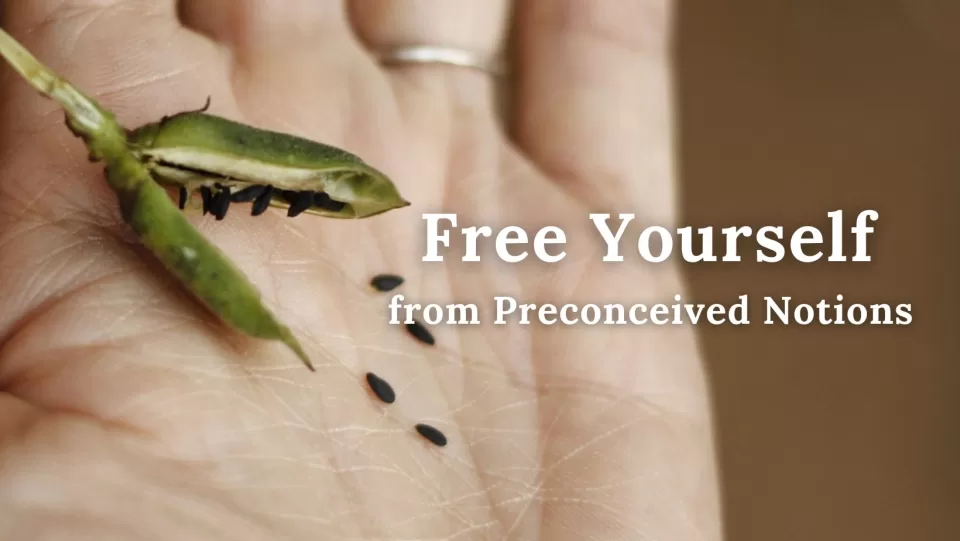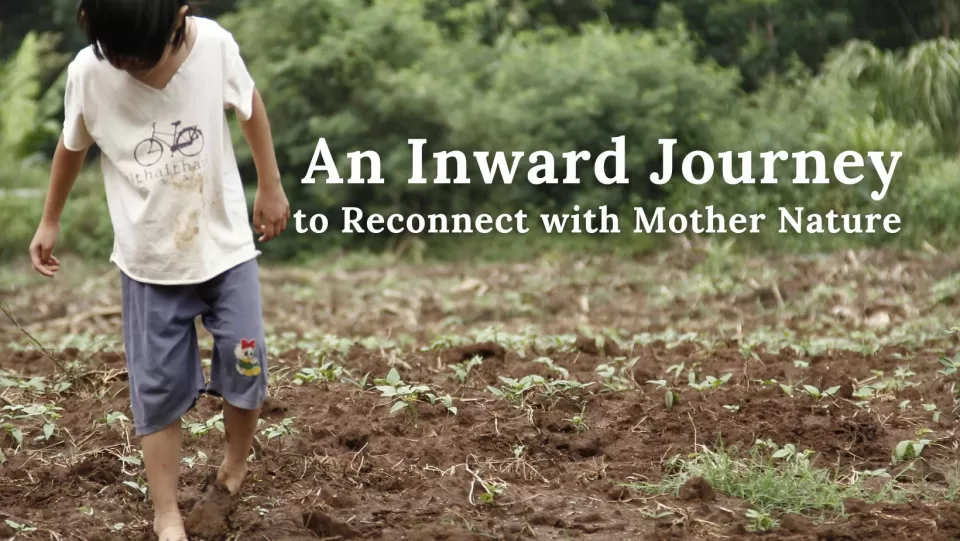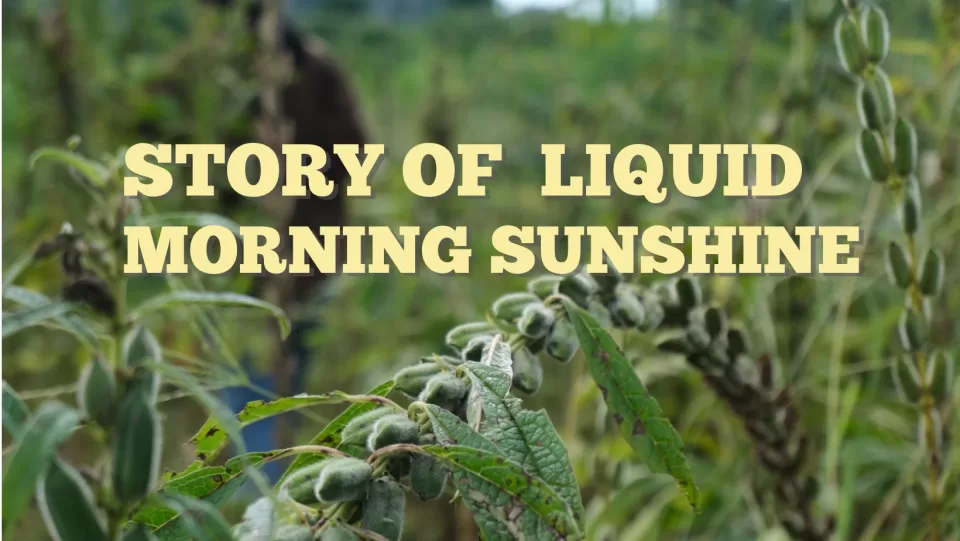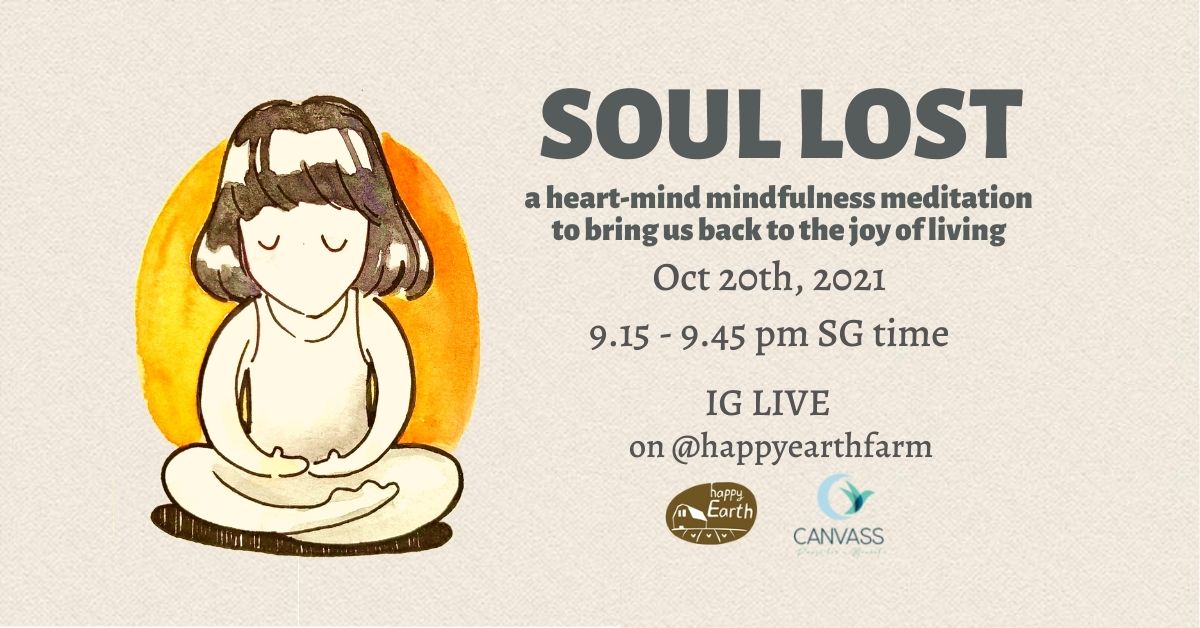
Soul Lost? Heart-Mind Meditation for Mental Health Awareness Month
October 14, 2021
No-Poo Method & How to Overcome the Transition Period
November 19, 2021Happy Earth, Happy Mother Water, Celebrating World River Day 2021

Throughout the history of humankind, we find that people always chose to settle close to water sources. It’s there where they made a living, grew food, built troops, moved across the oceans, and eventually started an empire. At an individual level, water pervades all aspects of life: It cleanses us, feeds us, transports us. Ultimately, water gives us life.
In Thailand, the connection with water and river lives in the word we use to call this very
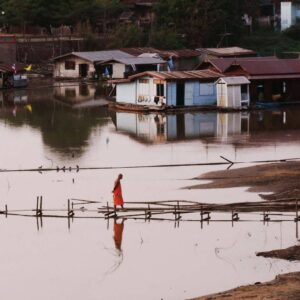
Credit: @oncebook
source of life. In Thai, water is ‘nam.’ We name the river, Mae-Nam which means Mother-Water. By referring to her as a Mother, it shows the reverence given to water as a birthing place of all things. And that is the relationship we are about to explore in this article.
- Life along the River in the Past
Thailand is a land of plenty, thanks to a generous amount of water and rainfall. We have a saying in Thai “ในน้ำมีปลา ในนามีข้าว” which means “In the river, we have fish. In the paddy, we have rice.” Whether it’s in the river or paddy, we can always find food. Both of which are powered by water.
For hundreds of years, Thai people have relied on rivers to make a living. Some lived on boats surrounding themselves with different kinds of edible plants, such as morning glory, that grew freely in the river. Others built houses along the rivers or streams and used boats to travel. Many sailed their boats to the floating market every morning to sell different kinds of vegetables, fruits or noodles.
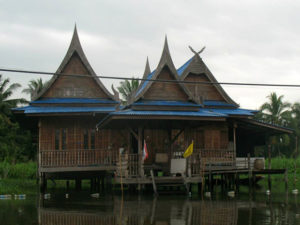
credit: https://www.banidea.com/river-home-thailand/
In the past, flooding was more welcomed than feared. Back then, houses were built high above the ground, so people wouldn’t have to worry when the flood arrived. At the same time, the rain would also bring more fish into a small pond. People would be very excited about fishing. This is true even for farm folks like us whose house is nowhere near the river.
There’s a story about the cave underneath Plarah hill, the small mountain in front of our farm. Grandma said years ago, villagers would come to that pond cave during the rainy season to fish because the pond would be full and the fish would swam up closer to the surface of the pond. So, catching them became easier. There would be so much fish to catch that people could make Plarah (fermented fish) for the rest of the year. This is why that mountain is named Plarah Hill.
- Thai River Celebrations
Our connection with Mother Water comes more vividly in my memory as a child growing up in Chiang Mai, the cultural city of Thailand. Twice a year, we would celebrate the existence of this very source of life: once during Songkran Water Festival, another during Loy Kra Tong Festival.
- Song Kran Festival
Song Kran Festival takes place in the middle of the hot, humid summer month. It marks the traditional Thai New Year. During this time, family members would gather and celebrate the occasion. We would take this opportunity to clean their houses as well as the Buddha statues at home. The flower-scented water used to clean the statues is considered blessed, It would later be sprinkled to give blessings to each other.
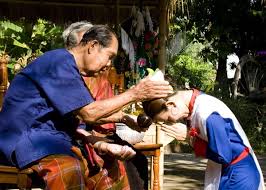
Credit: https://mgronline.com
After that, family members would proceed with the pardon ceremony. During this ritual, the younger generation would scoop blessed water in a small silver embroidered cup, kneel in front of their elders, and pour it over the hands of the latter. One by one, we would ask for forgiveness for our wrongs during the past year. Words would be exchanged and blessings would be given. For Thai people, a society generally too timid to show signs of affection, this ceremony is a display of love, respect, and affection. And water plays a central role in it.
- River Celebration in the past: Loy Kra Tong Festival
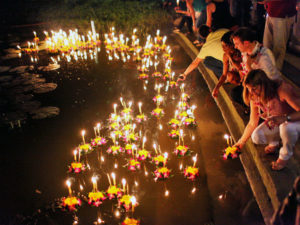
Credit: https://www.govivigo.com/
Loy Kra Tong Festival is another festival related to water and river. This time, it’s about showing gratitude to Mae Nam or Mother-Water for all she has done for us. Bouquets of flowers called Kra Tong were made using banana leaves and barks people find at home. Then, we would head to the river. Each of us would offer our Kra Tong to the Mother. We would light up the candles and incense inside the Kra Tong to show respect to her and float the Kra Tong along the river, wishing for good fortune ahead.
When I was young, there would be a long parade with people dressed up in traditional Thai costumes. They would tell us the story of this festival, which dates back from Sukhothai era (A.D. 1300). Houses would be decorated with traditional lanterns and candles. The sky would be lit up with thousands of lights from the floating lanterns. Fireworks would be hissing, crackling, and booming throughout the night. Loy Kra Tong songs would be played too, making the cold winter night more cheerful than usual. It was one of the fondest memories of my childhood. During this time of the year, for me, water is a symbol of gratitude, respect and blessing. It is the flow of life that never ends.
- Life along the river in the present
As time passes, our relationship with water has changed. Streams are buried and turned into roads. Boats are replaced by cars. Boat houses started to disappear. Traditional wood log houses along the river banks are replaced by brick houses on the concrete ground. Flooding becomes a nightmare. Families along the river would build a high wall between their houses and the river for fear of flooding during the rainy season. Gradually, We have drifted away from our Mother Water, both physically and spiritually.
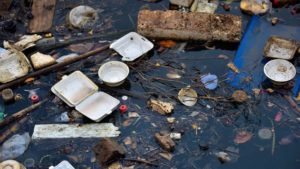
Credit: https://www.thairath.co.th/
As factories started to pop up along the banks, the river has become the dumpsite of chemically-laden runoff water. Agricultural waste, pesticides, and herbicides leached out into her every day. Chemicals in our hair and body care products also find their way into the river and disturb the ecosystem. Plastic waste is carelessly dumped into her. Fish are poisoned to death, with some would bobbing up along the river. Although we still call her Mother Water, she is no longer treated like the Mother we once did. Instead, she is exploited and used as a production resource and chemical dumpsite that fuels this competitive GDP-focused economy.
- Water celebration in the present
Riding the wave of capitalism, festivities like Song Kran or Loy Kra Tong changed through the years. They have become major tourist attractions that bring together hundreds of thousands of tourists yearly. Water fights, booze parties or, club crawls are well known in the Land of Smiles, especially during festive seasons. The true meaning behind these
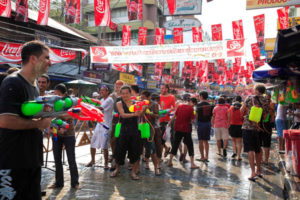
Credit: https://mgronline.com/travel/detail/9570000039971
festivals has changed as locals shifted focus towards making more money during those times. For many people, family time is replaced by money-making time of the year. Plastic water guns have replaced the old embroidered silver cup. Running water has replaced the flower-scented blessed water. The family ritual to make Kra Tong together is now replaced by commercially-made Kra Tong sold right at the river bank.
Time has become money. And money is then traded for convenience. Festivities are seen as one of the many tools that can fuel the local economy and hopefully lift people out of poverty. As that happens, the spirit of Mother River also disappears.
- River in the Future
As our Mother River nourishes us physically and spiritually, she continues to connect us with each other and make us whole rather than separate. Despite many efforts made to restore our rivers, it’s undeniable that the way we see her, use her and exploit her has caused havoc on her. All of us are at a crossroads and have to decide where to go. The sooner we can decide, the easier we can mend what has been damaged.
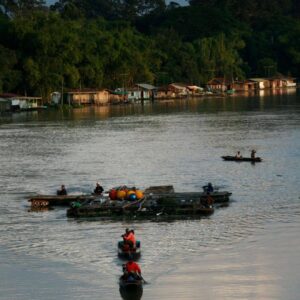
Credit: @oncebook
However, real fixing will not truly happen unless we change the way we see her. Can we show respect in the way we make use of her resources? Can we celebrate the festivities we’ve come to know and be reminded of their true meanings? Can we enjoy her without exploiting her? Then, we can choose what life we want to leave behind for our future generations, who will have to bear the consequences of our actions in the present.
Our relationship with Mother Water is one that represents our relationships with all beings. The more we are estranged from her, the more we become insensitive to our own selves and other beings surrounding us. As most of us are so busy building financial freedom and securities, we forget about our relationships with our very own Mothers. At the same time, we no longer recognize that it’s in that relationship that we find our happy place.
There might not be kids who enjoy catching fish in flooding water, but I envision a world where everyone knows where the fish they eat comes from and how it comes about.
There might not be many river houses whose dwellers enjoy picking morning glory for their dinner, but I can see a future where rivers come alive again and people can depend on it for food.
There might not be housewives waiting for boat vendors, but I think there will be a time when people can make use of the river without causing more pollution.
As we unravel our way to reconcile our relationship with our Mothers, we are also tracing back our cultural history and learning about our connections with our Mother Water. When that happens, our hope for a better future is within reach.
Happy World’s River Day everyone!


